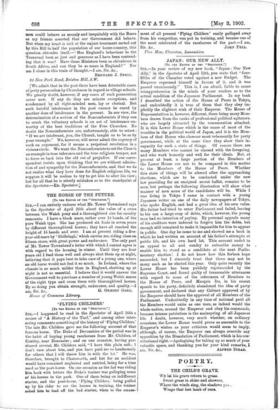JAPAN: OUR NEW ALLY.
rTo THE EDITOR OF THE "Rpm-rims:1
SIR,—In your review of my new book, " Japan : Our New Ally," in the Spectator of April 12th, you state that "four- fifths of the Chamber voted against a new Budget. The Emperor expressed himself in favour of it, and it was passed unanimously." This is, I am afraid, liable to cause misapprehension in the minds of your readers as to the actual condition of the Japanese Parliament. In my book I described the action of the House of Peers in Tokyo, and undoubtedly it is true of them that they obey im- plicitly the slightest wish of their Emperor. The House of Representatives is, however, different, there being many Mem- bers drawn from the ranks of professional political agitators, who are largely attracted by the remuneration attached. It is this Lower House which is the cause of most of the troubles in the political world of Japan, and it is the Mem- bers of that House who clamour most vehemently for party government, while at the same time they show their in- capacity for such a state of things. Of course there are many Members who cannot be classed with the foregoing, and who work honestly and well for their ideals. But, at present at least, a large portion of the Members of the Lower House are not to be compared in this matter to the Members of the House of Peers. Whether this state of things will be altered after the approaching elections, which are to be conducted under the new law providing for an unsigned secret ballot, remains to be seen, but perhaps the following illustration will show what manner of men some of the candidates will be. While I was living in Tokyo I came in contact with a young Japanese writer on one of the daily newspapers of Tokyo, who spoke English, and had a great idea of his own value. His father had tried to enter Parliament and failed, leaving to his son a large crop of debts, which, however, the young man had no intention of paying. By personal appeals many of his creditors were induced to forgive him the debts, but
enough still remained to make it impossible for him to appear in public. One day he came to me and showed me a book in which he had written an account of his father's attempts at public life, and his own hard lot. This account ended in an appeal to all and sundry to subscribe money to enable him to stand as a candidate at the next Parlia- mentary election ! I do not know how this forlorn hope succeeded, but I sincerely trust that there may not be many such as he elected this year. Only quite recently the Lower House has been publicly reprimanded by the Supreme Court, and found guilty of treasonable utterances with regard to some of the references of Members to the House of Peers, and Marquis Ito, in his recent speech to his party, definitely abandoned the idea of party government, and declared that any Cabinet approved of by the Emperor should have the approval of all Members of the Parliament. Undoubtedly in any time of national peril all the Members would unite as one man, as indeed would the whole nation, around the Emperor and obey his commands, because intense patriotism is the mainspring of all Japanese life. I doubt, however, very much whether, on ordinary occasions, the Lower House would prove so amenable to the• Emperor's wishes as your criticism would seem to imply, although, of course, the Emperor can always override any opposition by the Dissolution of Parliament, which is his con- stitutional right.—Apologising for taking up so much of your valuable space, and thanking you for your kind remarks, I










































 Previous page
Previous page